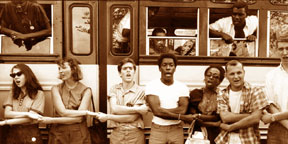
Freedom Summer activists sing before leaving training sessions at Western College for Women in Oxford, Ohio, for Mississippi in June 1964. (Ted Polumbaum Collection/Newseum)
Why was the summer of 1964 pivotal in the fight for civil rights?
We didn’t know whether civil rights workers James Chaney, Andrew Goodman and Michael Schwerner would be found alive down in Mississippi. We also didn’t know whether the Civil Rights Act of 1964, without badly needed voting-rights protections, would begin to fulfill Dr. Martin Luther King Jr.’s dream of a new American racial order, following a hundred years’ war between advocates for full and equal Black citizenship and the architects of all the snares that had hampered Black progress since the collapse of Reconstruction in 1876.
What we did sense was that the movement had grown younger, more radical, more diverse and increasingly powered by what Robert “Bob” Parris Moses, the pivotal planner of Freedom Summer, has called “We, the people’ force.”
Before Sly and the Family Stone released their hit song “Everyday People,” the volunteers of Freedom Summer lived the philosophy behind it—school by school, vote by vote, blow by blow. Moses—truly one of the heroes in the history of the African American people—compared “the language” animating this noble effort to that “of the ocean, the everyday language of everyday people.” And when its wave crashed in Mississippi in June, July and Aug. of 1964, the reverberation was so loud and deep that we could hear it and feel it all the way up in the Allegheny Mountains surrounding my small home-town of Piedmont, W.Va.
One thing was for sure: None of us would ever be the same. Nor would America. To me, Freedom Summer’s greatest legacy is the counterintuitive philosophy behind it. After decades of a “top down” organizing strategy, Moses and Ella Baker flipped the script, galvanizing everyday people to learn and lead themselves. And it is—it always will be—a blueprint for change.


Be the first to comment